Classic car auctions can be enormously entertaining events featuring wild mano a mano jousts of dueling checkbooks, or not. Much depends on the person at the rostrum wielding the gavel. In the case of Gooding & Company, the auction rostrum is home to one of the most capable and entertaining auctioneers in the world.
Meet Charlie Ross.
Charlie Ross, Gooding’s Master of the Auction Rostrum
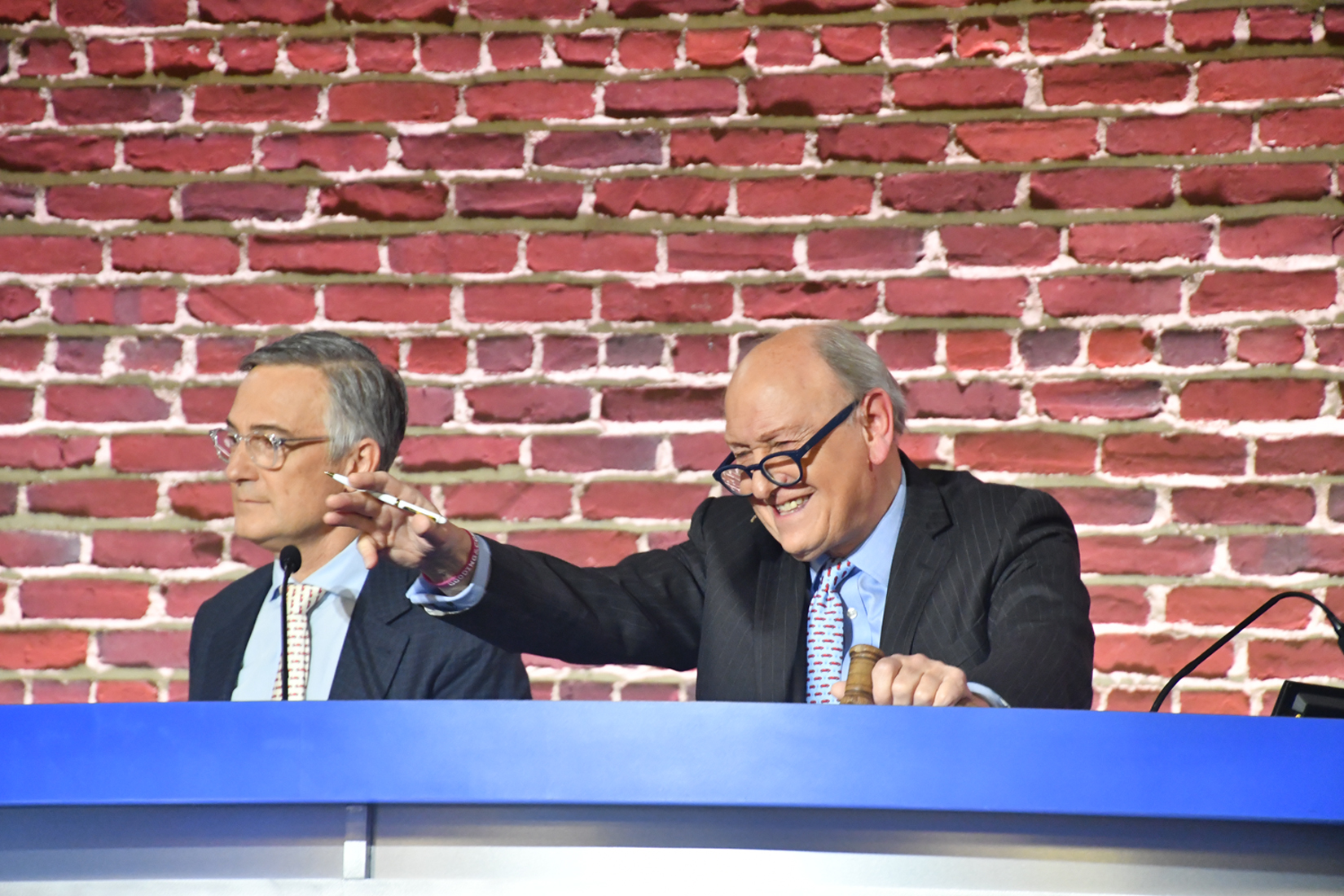
Charlie Ross with David Gooding to his right
Clearly this auction presented an uncommon if not unique set of circumstances that played to my interests. While wiling away time in the Blue Ridge Mountains, I had learned of a Gooding & Company auction disposing of a local collection containing a diverse array of desirable and unrestored classic cars. Even better for me and quite unusual for Gooding, the auction would not be hosted in an expansive and elegant setting capable of accommodating an audience that could easily exceed a thousand.
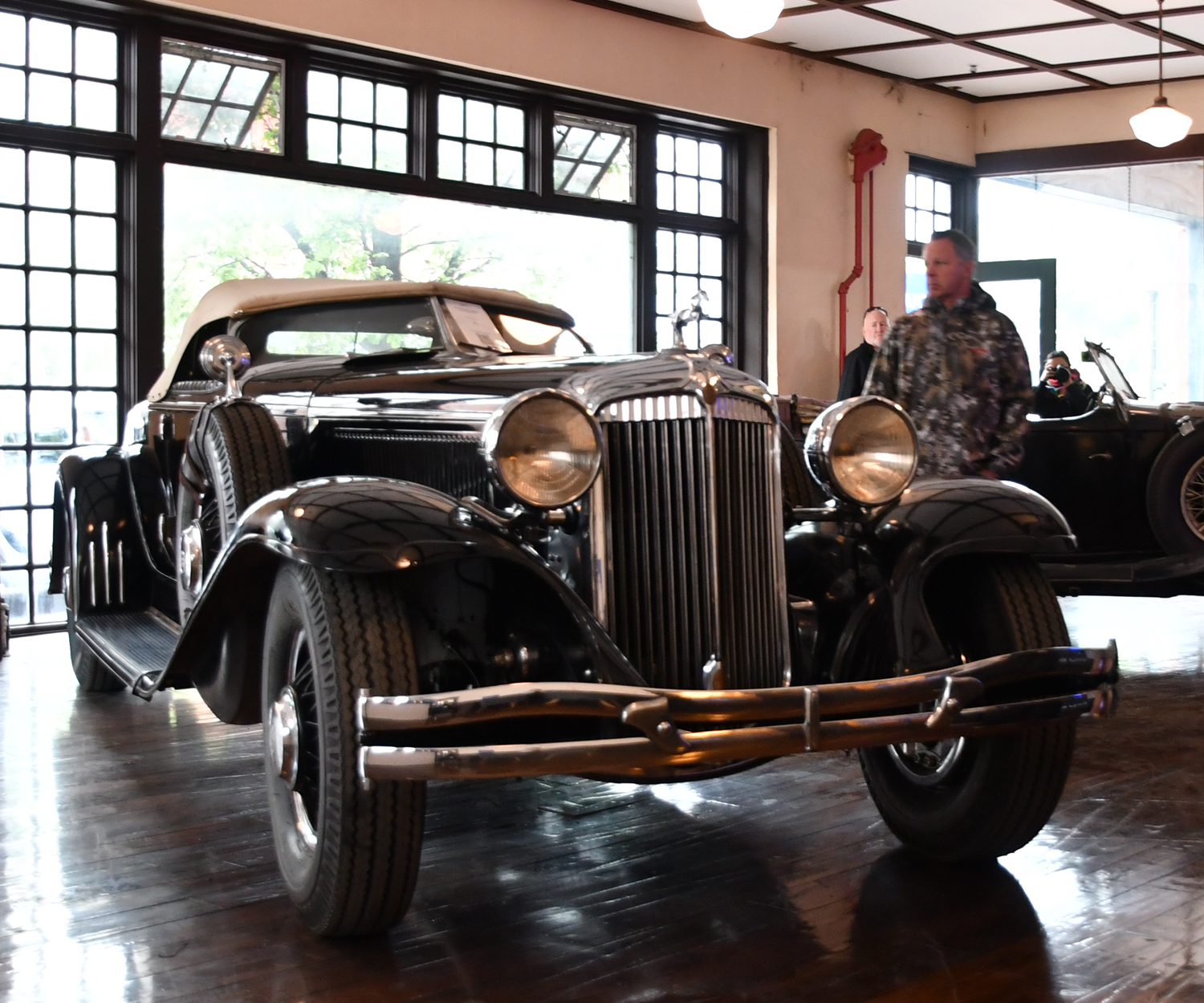
1932 Chrysler CG Imperial Custom Roadster at Lynchburg auction
In this instance the feel would be decidedly boutique-like with the action taking place in a well preserved early 20th century Chrysler dealership that had housed part of the deceased owner’s collection. Rich with 1930s charm and character but sparing in space, there would be no elevated stage for displaying the car at bid in the flesh, so to speak. To accommodate the limited space photos of the vehicle being bid upon would be displayed on large screens flanking the rostrum. Up close and personal inspection of the vehicles prior to auction would take place in a nearby warehouse. Being set for April seventh in Lynchburg, Virginia it was only a short distance away for me and just a few days in the future. Best of all, it offered an excellent opportunity to interview the Gooding & Company auctioneer extraordinaire, Charlie Ross.
I had never personally met auctioneer and BBC antiques expert Charlie Ross but I had seen him in action and enjoyed and admired his work. The following quote says it all:
“Without doubt the finest auctioneer I have ever seen in action is Mr. Charlie Ross. Charlie’s vast experience and ease on the rostrum,
combined with his charm and quick wit, enable him to engage and keep total control of a room that is sometimes as large as two
thousand people.”
Quite the performance review indeed, especially from the man who owns the company. That quote comes from David Gooding, President and Founder of Gooding & Company. For those unfamiliar with Gooding & Company, it is recognized as one of the premier auction houses in the classic car market. One can measure Gooding’s success in the fact that, to date, Gooding holds the world sales records for 12 marques including Ferrari, Porsche, McLaren, Duesenberg and Bugatti. It is not a coincidence that since Gooding & Company’s inception in 2004 the auctioneer for every Gooding auction but one has been Charlie Ross. (A detached retina forced his one absence).
I jumped at the opportunity to request an interview with Charlie Ross. The Gooding staff could not have been more accommodating. Specific thanks go to Gooding Publicist Pauline Pechakjian.
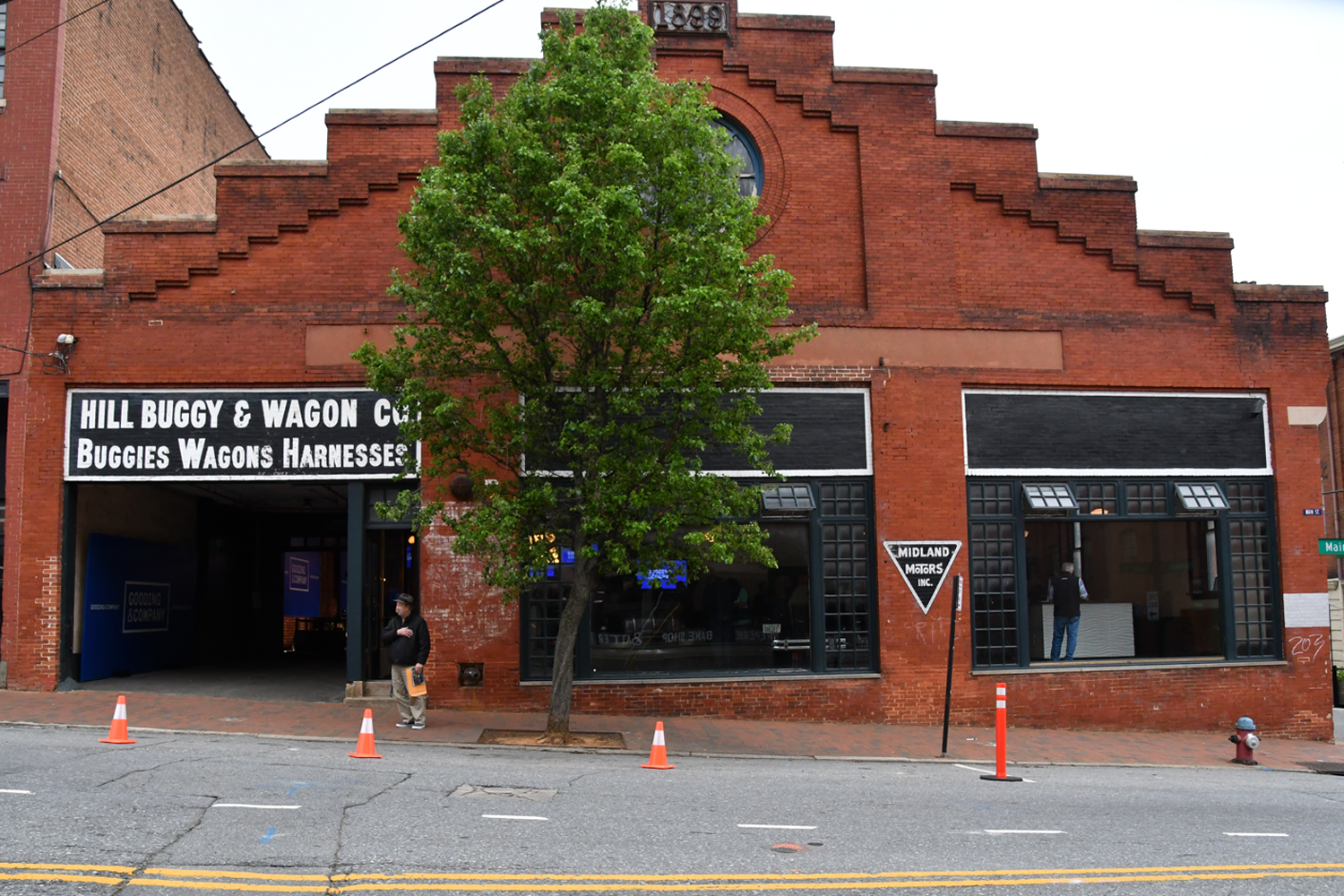
Chrysler dealership (Location of Gooding Lynchburg auction)
Residing at the pinnacle in the field of auctioneering, Charlie Ross exudes the consummate professionalism of an astute English barrister and the awareness of a seasoned entertainer, all leavened with a dry, sly, quick and engaging wit. He puts all of it to work in orchestrating the sale of some of the world’s most prized articles to many of the world’s most wealthy and knowledgeable collectors. Wielding a seamless synergy of superior platform skills with a proper British tongue, Charlie consistently manages each auction in a supremely entertaining fashion while fairly serving the interests of both seller and bidder alike. Charlie’s path to success, however, did not come by way of childhood dreams realized, quite the contrary.
Early on Charlie dreamed of emulating his uncle Mac. Charlie recalls, “Uncle Mac was a dentist who lived at the absolute top of the tree so to speak.” His uncle Mac had a practice on prestigious Harley Street in London. Charlie says, “He was Winston Churchill’s dentist, Bob Hope’s dentist. The list of notables goes on and on.” In Charlie’s mind his future had been decided. He would be a dentist to the rich and famous just like his Uncle Mac. However, taking the entry exams required to pursue a career in dentistry quickly quashed Charlie’s dreams of a rich and fulfilling life fixing teeth. Apparently Charlie’s many gifts did not include those necessary for success in dentistry. However, his future held in store a vocation that would involve him with a cohort not unlike that of his Uncle Mac.
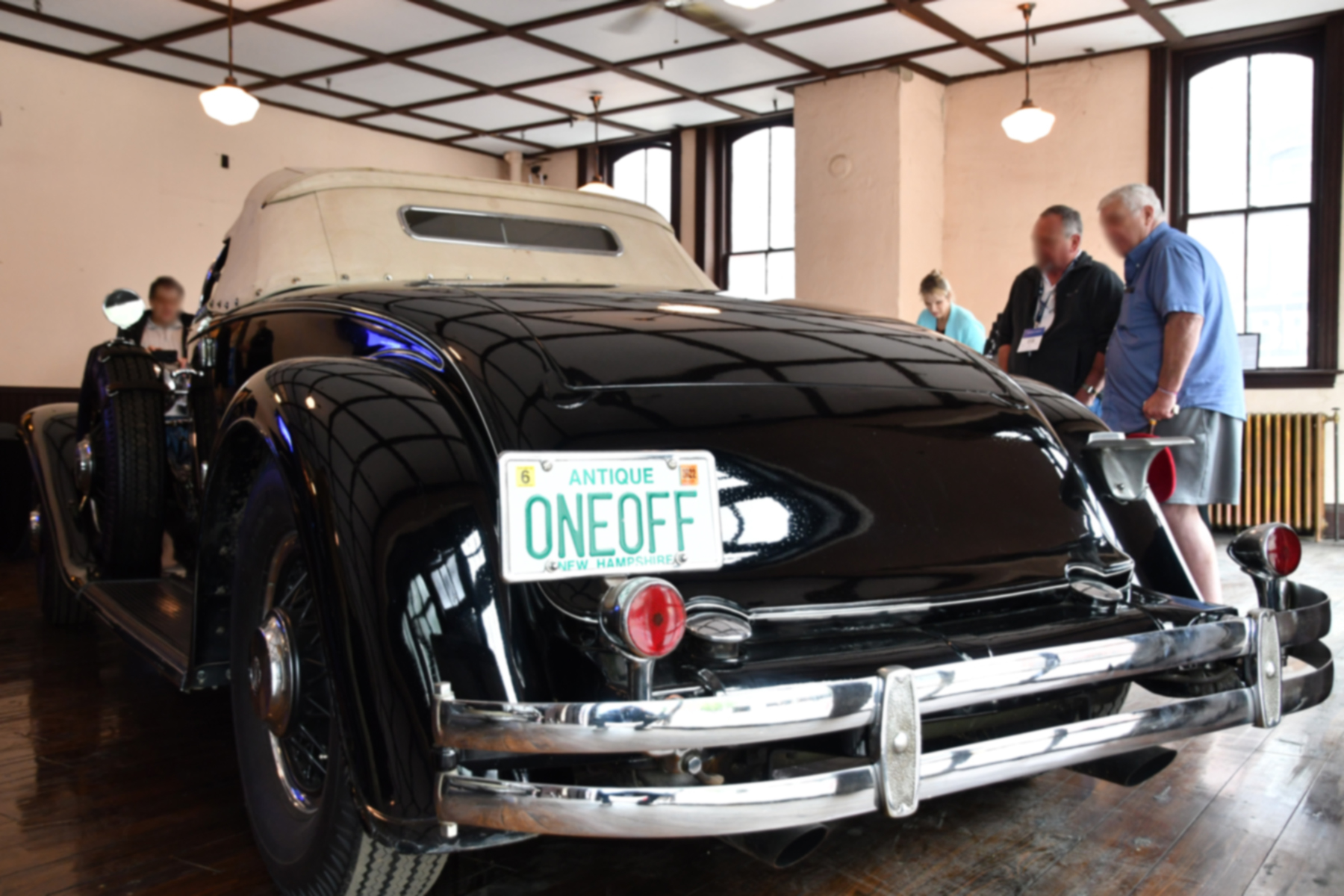
1932 Chrysler (rear)
Plan “B” commenced with a reversal in family fortunes that dictated that Charlie, then 18-years old, find work, Now! Two choices presented themselves. One dealt with processing fuels. The other offered an opportunity to join a firm of local auctioneers who Charlie says, “Sold your house, your farm, your chickens, your furniture and so on.” Charlie’s decision clearly favored poultry over petrol. He joined the auction firm of W.S. Johnson & Company in September of 1968.
By October first Charlie found himself auctioning pens of chickens in England’s open air Bletchley Market. As Charlie proudly relates, soon afterwards his auctioneering skill elevated his status to auctioneer of turkeys. Proudly recounting his success with turkeys, Charlie says. “In the week before Christmas in 1968 I sold 967 dead turkeys, individually. What a triumph that was for my career.” He began sensing the seeds of a future. Indeed, his vision proved out. As his employer had an auction room for antiques, Charlie quickly advanced from avian auctioning to gaveling antiques. In retrospect, no doubt could exist that this opportunity would set the course for the rest of Charlie’s life. And Charlie remembers the moment the die was cast.
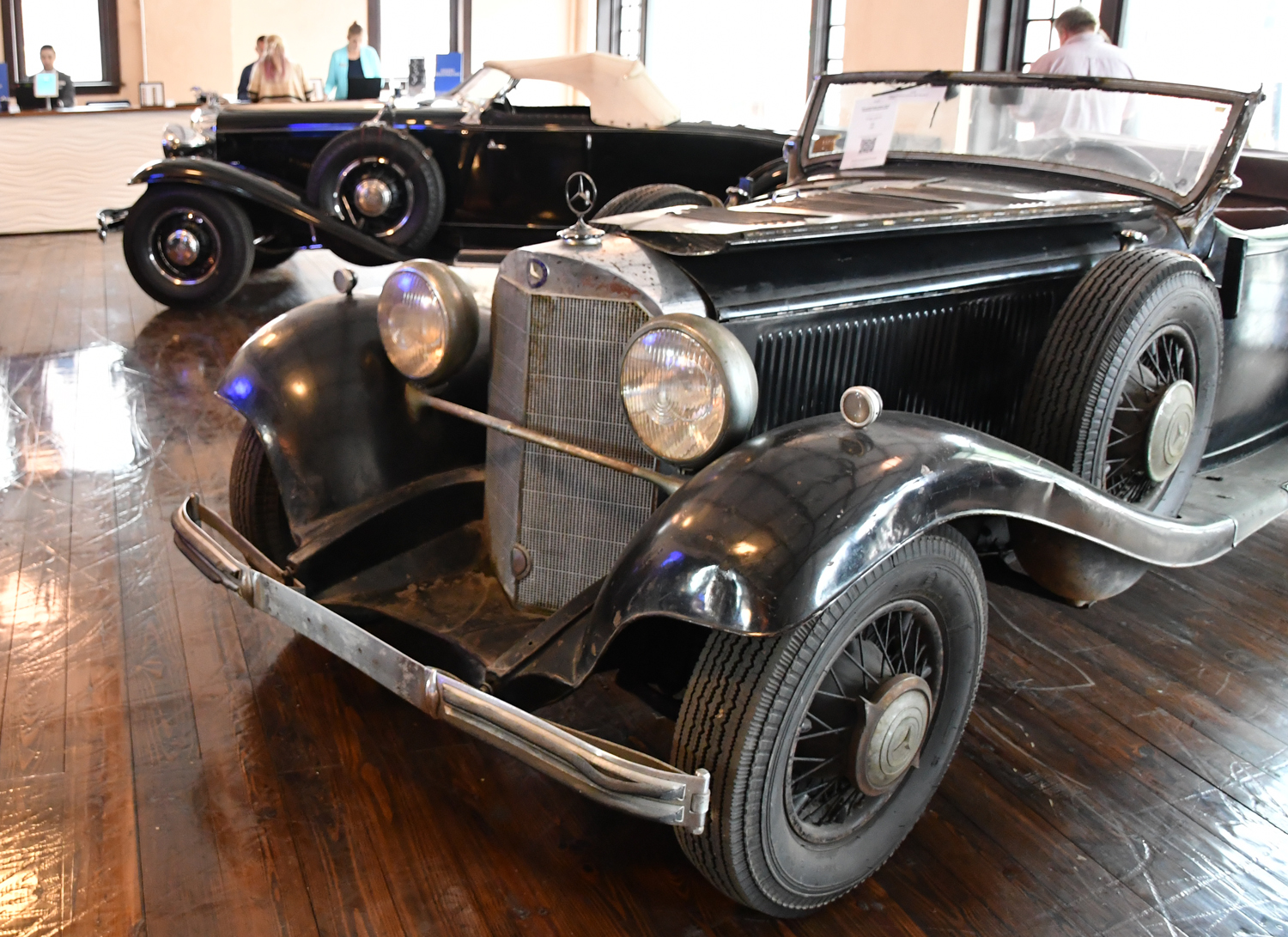
1934 Mercedes-Benz 500 K Offener Tourenwagen (in foreground) at Lynchburg auction
Charlie remembers clearly saying, “In the furniture auction room I was working for a fine man named John Collins who was a superb auctioneer. It was at that time, I was 19-years old, that I fell in love with antique furniture.” Charlie would stand in the back of the auction room and soak in the beauty, craftsmanship and history of the pieces that would cross the auction block.
The pivotal moment in Charlie’s life arrived when John Collins, in the middle of an auction, stopped the action to inform the audience, “Ladies and gentlemen Mr. Ross will now take over.” With that the wise John Collins surrendered the rostrum to the very young Charlie Ross who Collins knew was ready. Charlie says, “It was the best possible way to do it. It gave me no time to worry. Just do it.” Charlie did. Indeed there would be no stopping him. By 1983 he had his own saleroom. Then came the big break.
By the turn of the new century, Charlie, with his passion for antiques and a special love for Georgian furniture, had become somewhat of a BBC personality. His encyclopedic knowledge of antiques had him featured on BBC programs like Antiques Road Show, Flog It and Bargain Hunt.
Then around 2003, a dear friend of Charlie’s, Peter Bainbridge, an accomplished auctioneer working with RM Auctions (now RM Sotheby’s) told Charlie that he had recommended him to David Gooding who had been President of RM Auctions. Charlie says, Apparently David expressed to Peter his intention to launch his new venture, Gooding & Company, with its first classic car auction. It would be at the prestigious Pebble Beach Concours d’Elegance in 2004. David told Peter that he had the site and the cars but needed an auctioneer. Charlie fondly remembers saying, “Peter proving our close friendship advocated on my behalf saying, there’s this funny old chap in England. While he’s got no car experience, he’s got a saleroom in Wobern and he’s a good auctioneer. In my opinion you two would get on very well.” David and Charlie did and the rest is auction history. Charlie offers very forthright answers about what others describe as an incredibly successful career at the Gooding rostrum.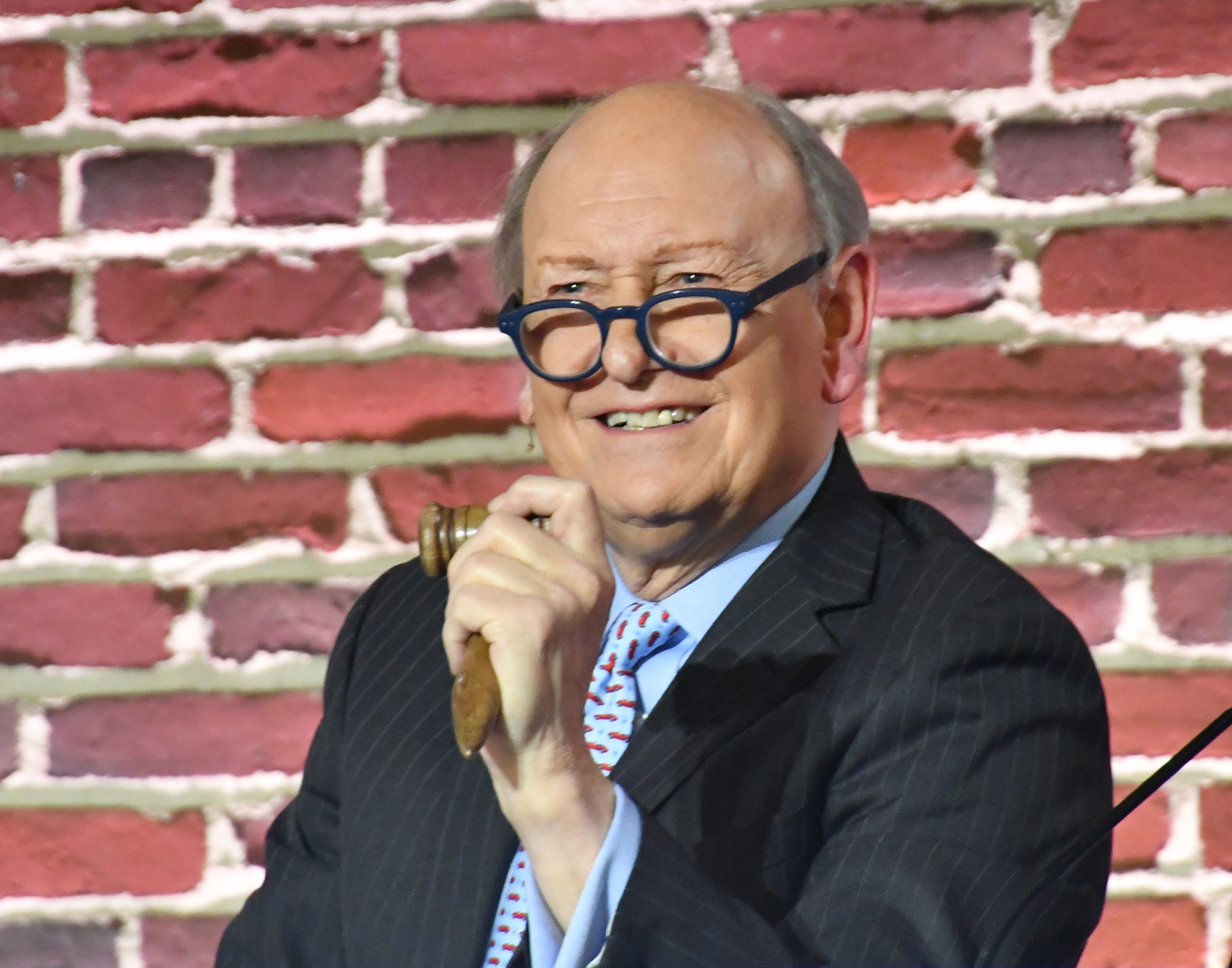
“No,” admits Charley, “I do not know vintage cars like I know antique furniture. Gooding & Company’s expertise equips me with a detailed knowledge base beyond what I need to successfully manage the auction of the kind of top tier vehicles that cross the Gooding block.”
When asked how he has earned his reputation as a master at maintaining control of a room Charlie says, “Achieving and maintaining control? Have a clear voice. Sound authoritative but flavor it with a certain light-hearted air.” Charlie believes strongly that if you get people on your side they will do what you want them to do. He also makes very clear the penalty exacted by being too domineering. He says, “If you get too dictatorial the audience will rebel. Most everyone likes to take the “Mickey” out of someone that’s a bit too full of themselves.”
Charlie benefits as well from the presence of one particular colleague working the phone lines. That would be his wife, Sally Ross, better known in auction circles as Lady Ross. One of Charlie’s great interactions with Lady Ross came during the 2018
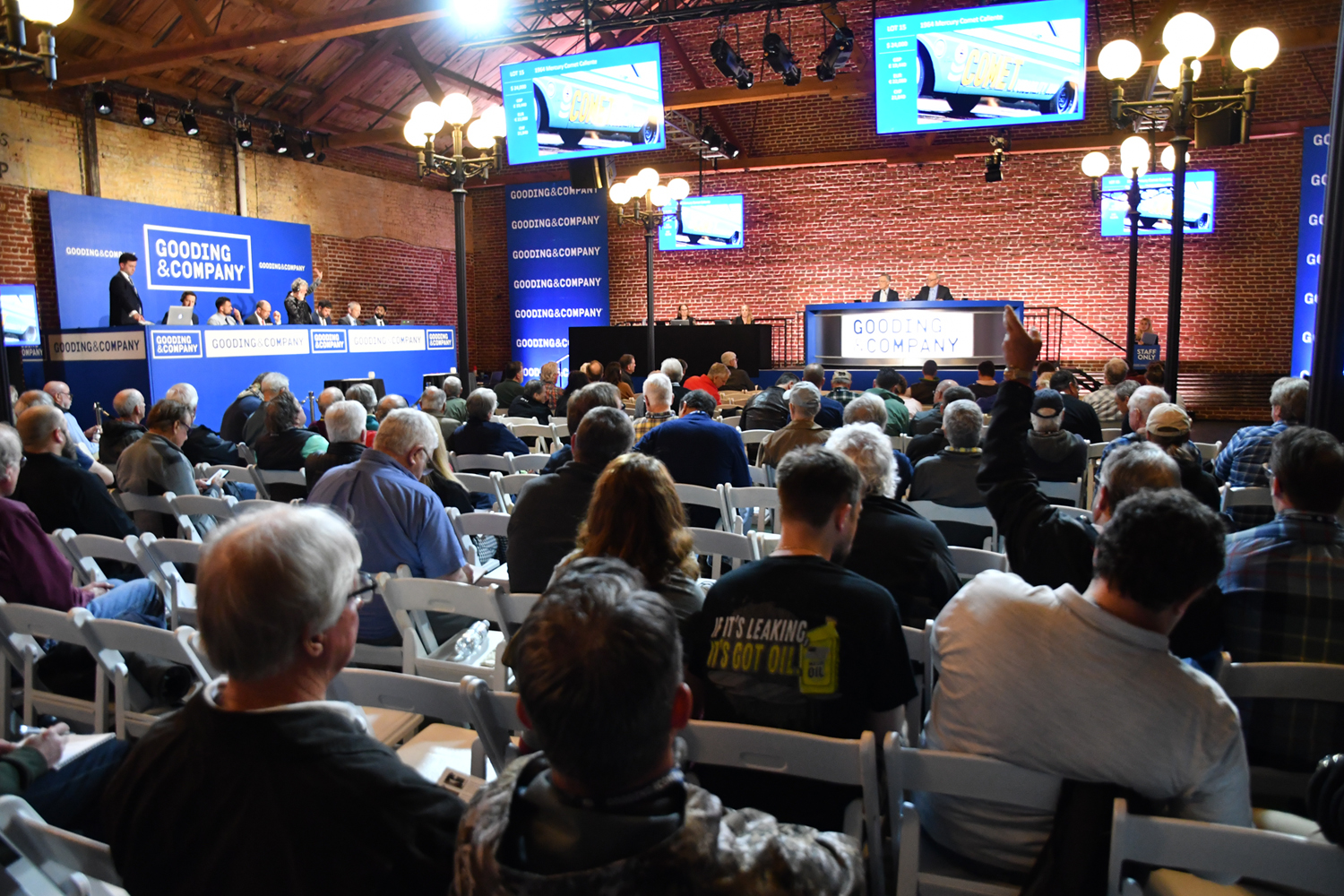
Audience at Gooding Lynchburg Auction
Gooding auction of Miles Collier’s 1935 Duesenberg SSJ once owned by Gary Cooper. In a positively electric auction environment approaching a frenzy, bids had blown by the low estimate of $10 million. Charlie smiling at the recollection says, “It was quite apparent that there were two people who really wanted that car at almost any price.” Lady Ross was going strong representing one bidder on the phone. Then with the bid having reached $15 million on a phone bid from the other bidder that drew a gasp from the crowd all eyes turned to Lady Ross. With exquisite timing in a room positively rocking, Charlie paused the bidding, and turning to Lady Ross at the phones across the room, said, ”Ladies and gentlemen hold on for a moment please. Lady Ross, you’re not bidding on your own behalf are you?” She said no and the room burst into laughter. To complete the story, the bidding carried on with Lady Ross dropping out at $19 million. The winning bid plus buyer’s premium reached $22 million.
Charlie says, “What a wonderful experience. You could feel the warmth of the crowd coming with you, everybody’s on your side, they’re on the bidders side. The crowd pulsed with the intoxication of a special moment when expert estimates were cast aside by a passionate desire shared by two people of means intent on possessing something exceptional, whatever the cost. It was a very, very exciting moment.” The $22 million result set a standing sales record for all Duesenbergs and, in fact, all Pre-WWII cars.
When asked if he has any preference for audiences, Charlie clearly prefers a crowd. He says, “It’s very possible to create a good atmosphere with fifty or sixty people in attendance.” That said, Charlie’s style and energy delivers the power to drive the largest of rooms. He makes no bones when saying that a very small live audience with most of the bidding offsite leaves precious little kindling to heat the room.
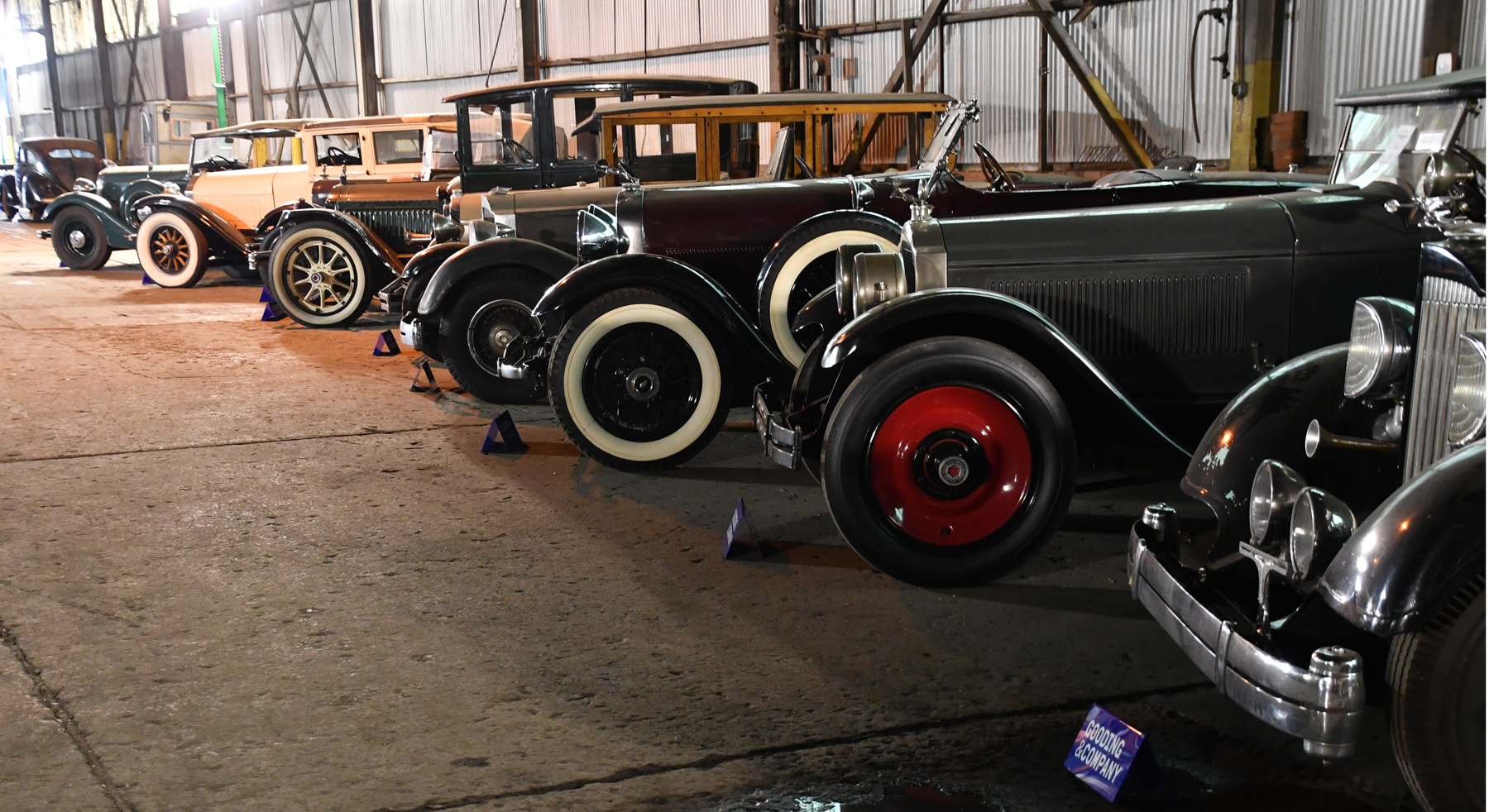
Vehicles for inspection at warehouse
A Brit by birth, Charlie finds members of different cultures express distinct personalities when participating in an auction. Charlie says, “I have conducted auctions in Mumbai, India. The mood there clearly projected a greater seriousness than say in American. Though the bidding was not on cars but footballer contracts.” He does believe Americans are better audiences. He says with conviction, “They are more fun, you know. At a Pebble Beach or Amelia Island, there’s somewhat of a party atmosphere. Of course, there are people there prepared to spend $10 million, $20 million. There’s also a lot of people there who are there just for, what the Irish would call “the crack” you know, the fun and the jollity.” When it comes to the English, not as much fun.” Charlie says, “In England people that deal in cars at the top end, in my experience, take themselves a bit more seriously. Without any justification I might add. They can be a bit arrogant. And I am an Englishmen talking.”
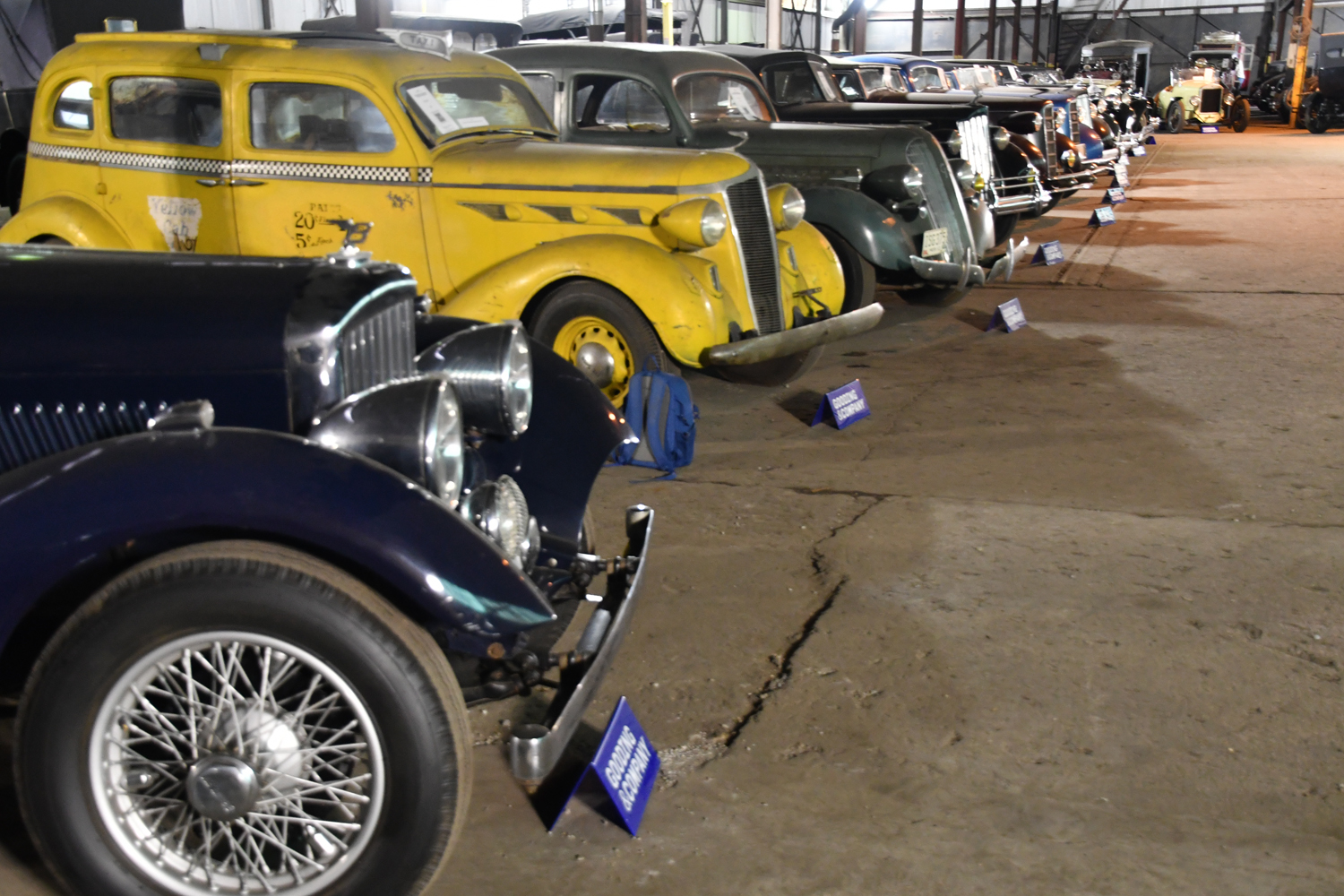
Vehicles for inspection at warehouse
Clearly reading the audience demands a specific skill regardless the venue. When asked Charlie says, “Experience experience. I do think rooms differ depending on what you’re selling. You know, if you’re selling chickens to a bunch of farmers, they are a very different breed from car collectors with million pound bids
at the ready.” However, Charlie emphatically states, “Everybody is a human being and responds well to being understood. If you can relate to them, whether being serious, or having a laugh or appreciating the spectrum of emotions in between, meaningful communication will occur.” Charlie says, “That is where I would like to believe my skill lies.”
Clearly a most important skill at the rostrum stands as the ability to “tease” out a price. Charlie says, “A little humor bordering on flippancy can provide a hesitant bidder with an appropriately gentle nudge to action.”
An example used by Charlie describes a situation where bidder “A” bids $1.1 million and bidder “B” bids up to $1.15 million. Clearly the pressure rests on bidder “A” and Charlie would like to see him go to $1.2 million but the bidder has turned hesitant. Here Charlie remarks, “I might take the liberty to suggest that, well frankly, if you’ve got $1.1 million you must have $1.2 million. It can work but other times a bidder has established a hard line. Then he will just smile and hold firm with his “no.”
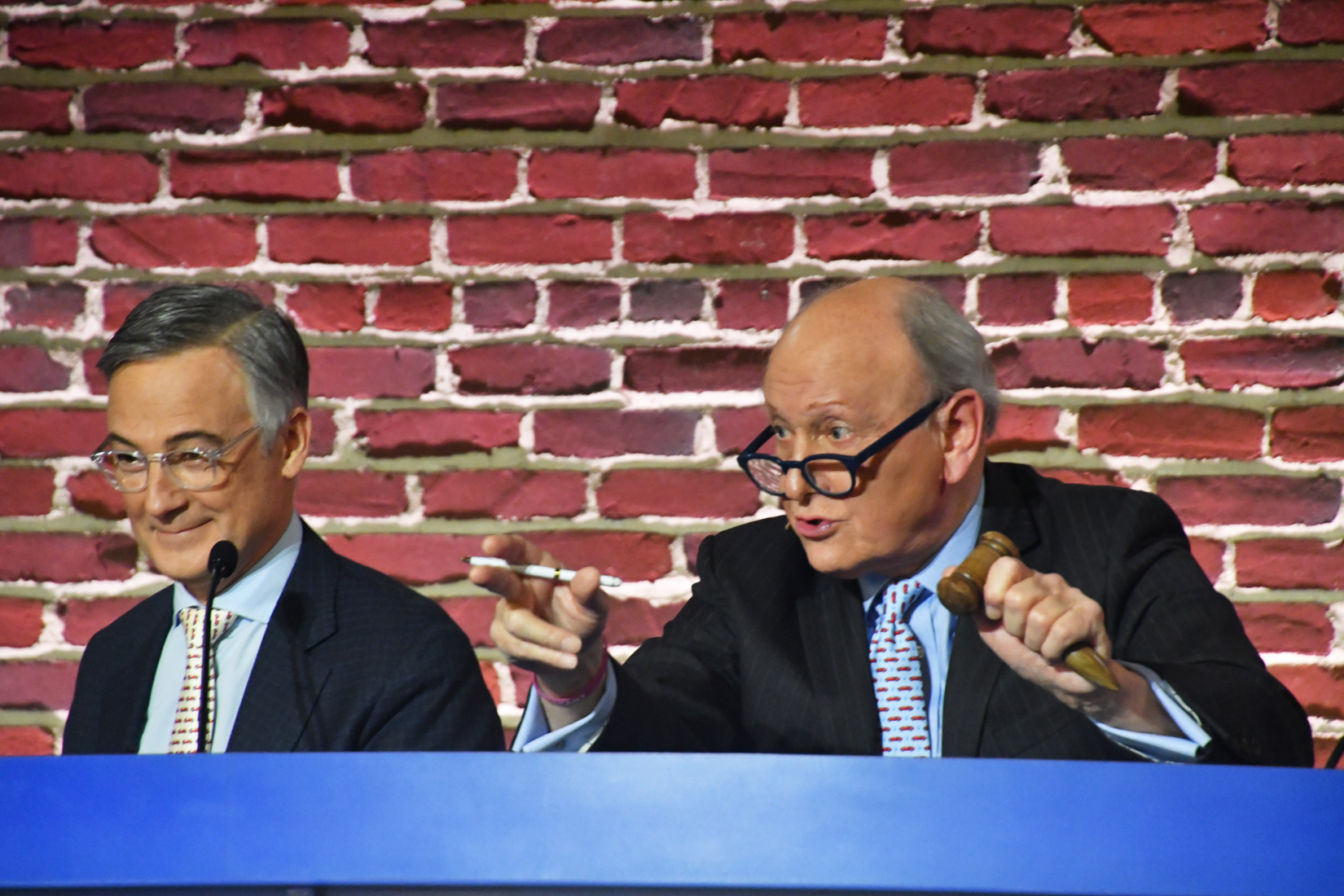
Nobody has enjoyed a better seat to view the evolution of the classic car market and value trends at auction than Charlie. From everything he has witnessed, He says, “ First and foremost, the top-end has always ruled.” Someone once asked Charlie what were the cheapest lots he had ever sold in his saleroom. He responded, “The most expensive lots were the cheapest because ultimately, the number one lot is what everybody wants now. And subsequently, when it comes on the market again, in 5 years, 10 years or 20 years, everybody will still want it.” He has seen that the best or most expensive items over time, almost as a rule, gain in price. For more run-of-the-mill items, that does not necessarily hold true. He says, “Buyers don’t necessarily want the second grade or the third grade but the best is always the best.”
As to the tastes prevailing in the current marketplace Charlie expressed a clear opinion saying, “Modern, modern, modern seems to be the way forward. Modern and low mileage.” In referencing the cars of the Mark Smith Collection that would be crossing the auction block the following day, Charlie offered some pointed comments. With a hint of concern He said, “Interest in modern seems to trump pre-war vehicles. I am hoping that assessment will be proven wrong tomorrow. I say that because a lot of these wonderful cars in the Mark Smith collection are pre-war cars.” He went on to reflect on the tilt toward modern in bidder interests saying, “We’ve seen an explosion of interest in Porsches and Ferraris from the last twenty years, low mileage examples.”
Charlie shared his perspective on the interest expressed in modern cars by younger bidders, those referred to as “Youngtimers.” He reflected with a nod to the reality that the wonderful old collectors in their 80s and 90s, like old auctioneers, will not be with us forever.
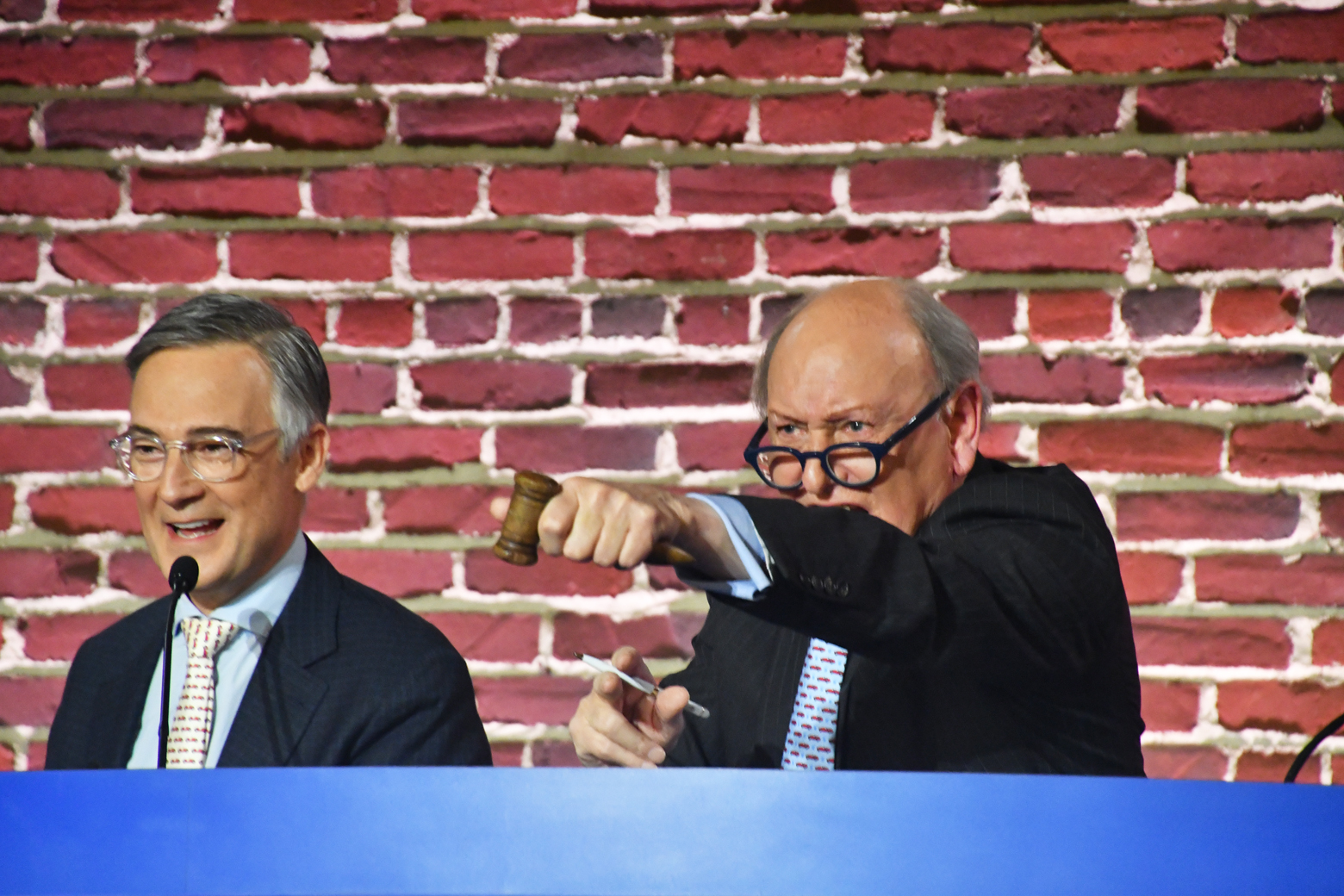
SOLD!
He observes that despite their glorious nature and head-turning beauty, pre-war Olympian cars such as Duesenbergs, Packards, Lincolns and Cadillacs do not deliver the enjoyable driving experience offered by the modern tier 1 collectible. Charlie says, “I don’t believe the younger car enthusiast wants to be worried about whether his prized car will start or stop. Many don’t want to deal with it. I question their desire to stick their heads under the bonnet. They desire a car that can be driven with ease and enjoyed with little concern for reliability.”
In considering the buying population he serves, Charlie says, “I would like to think that the person buying these best cars is cut of the same cloth as a chap with a Ferrari 250 GTO who turned up at one of our auctions driving it. This is a car worth $30 million, $40 million. He parks it outside and the people, this happens to be in England, are shocked by his driving it. The owner’s response, ‘Of course I bloody well drive it. It’s a car.’”
In closing, Charlie, in considering the David Gooding quote, admits, “There are a lot of auctioneers in the world, David’s comment makes me feel very warm. It makes me think that, in life, there is one thing I can do well.”
Very well, indeed.

I’ve had the good fortune of watching Mr. Ross in person. Your piece does a great job of filing in the details and recounting the experiences of someone who
truly loves the path they’ve chosen.
He is a pleasure to watch and a fine gentleman in person. You are dead on when you say that he truly loves the path he has chosen.